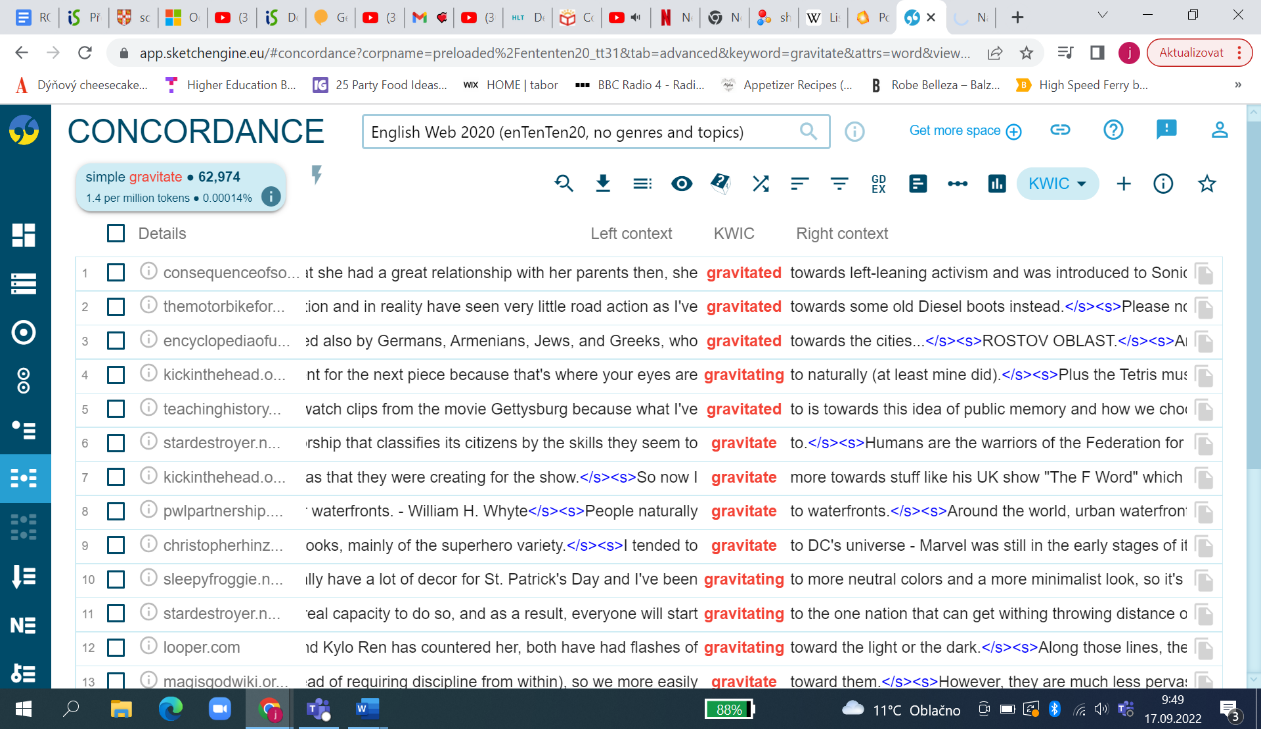- Home
- Various Articles - Methods and approaches
- Exploring Technical Vocabulary in the ESP Classroom with Sketch Engine
Exploring Technical Vocabulary in the ESP Classroom with Sketch Engine
Jana Kubrická is a teacher and researcher at the Language Centre of Masaryk University, Brno. She has been teaching numerous ESP courses in which she focuses on syllabus design and creative ways of engaging the professional identity of learners. She is also a CLIL teacher trainer, teacher of language courses for older adults and an explorer of the underlying factors in language teaching and learning, such as learner beliefs and identities. Email: kubricka@sci.muni.cz
Introduction
Having taught English for Specific Purposes (ESP) to different groups of students, it has often struck me how rarely the boundary between specific and general English is crossed or challenged in teaching materials and, frankly, in my own ESP lessons.
The fact that my students rarely took advantage of the wealth of their technical vocabulary in other than technical contexts seemed like a wasted opportunity and a real shame. Wouldn’t our conversations be much more enjoyable if even B1–B2 learners of English casually spiced them up with science-based metaphors? I could see a future chemist referring to an indicator of something as “the litmus paper”, a young wannabe geographer calling someone’s writing “arid”, or a mathematician dropping hints about someone’s lecture “going off on tangents”.
And so, whenever I came across a “sciencey” word while reading newspaper articles, books or watching films, I wrote it down on a special, and as it turned out later a very precious, scrap of paper stuck onto the old noticeboard above my desk. I had a hunch I could turn these words and phrases into an interesting lesson.
Activity description
Once I started using Sketch Engine, an app that helps analyse language data in corpora, I finally came up with the right idea for my lesson. The app (https://www.sketchengine.eu/), which we at our university are lucky to access for free under an institutional login, offers plenty of options for language exploration of collocations (word sketch), synonyms (thesaurus), as well as statistics on a whole corpus (text type analysis).
The function I found suitable for the purposes of studying technical vocabulary in different contexts is concordance. By simply entering a word, we get examples from the chosen corpora showing the usage of the expression. The example of the word gravitate (Fig. 1) demonstrates that the word is frequently used in general English contexts as a tendency to move towards something. The display options allow us to read whole sentences, if necessary. For more examples suitable for the activity, see the list of technical vocabulary from various scientific disciplines below.
The added value
The benefit of Sketch Engine compared to a dictionary is that with the app students study numerous authentic examples and deduce the general English meaning by themselves. This allows them to work autonomously and fosters their critical thinking. Personally, I use this activity as a follow-up to a lesson or series of lessons in which students have studied new vocabulary in technical contexts.
Another task building on this Sketch Engine activity is to encourage students to use some of their technical terms in a figurative sense in writing. It is then the job of their peers to identify the word and comment on its usage in their feedback.
Conclusion
From experience I can say that using Sketch Engine was intuitive enough for my students who use various digital tools regularly. Concordancing their newly acquired vocabulary was also a satisfying and empowering task,. As the students mentioned in the course feedback, it made them see that English is “incredibly rich and you can play with the meanings”. Hopefully, using corpora and the tools for their exploration will foster this love for English and language learning in more students.
Fig. 1 Concordance output for gravitate

Examples of technical vocabulary commonly used in General English with a metaphorical meaning
Geography and geology
confluence
epicentre
seismic
catchment
gem
lustre
stratospheric
summit
Physics and mathematics
inertia
momentum
vacuum
buoyancy
magnetic
repulsive
oblique
converge
Life Science
virus
placebo
catalyst
buffer
osmosis
ambivalent
parasite
amorphous
Please check the Pilgrims f2f courses at Pilgrims website.
Please check the Pilgrims online courses at Pilgrims website
Exploring Technical Vocabulary in the ESP Classroom with Sketch Engine
Jana Kubrická, the Czech RepublicA Stitch (of Self-regulated Learning) in Time Saves Nine
Martina Šindelárová Skupenová, the Czech RepublicRaising Students´ Employability by Targeting Transferable Skills in Task-based Teaching
Dita Hochmanová, the Czech Republic